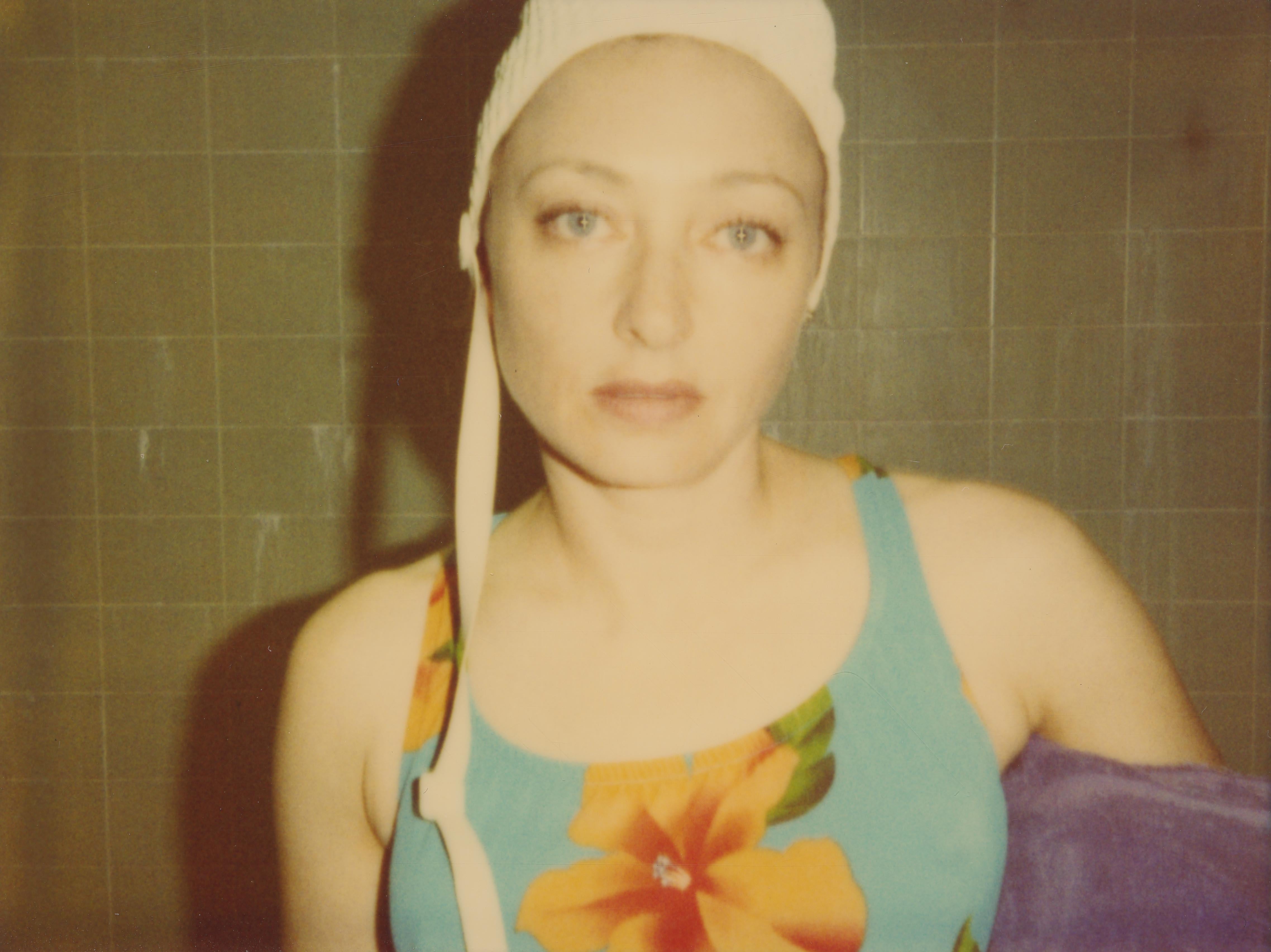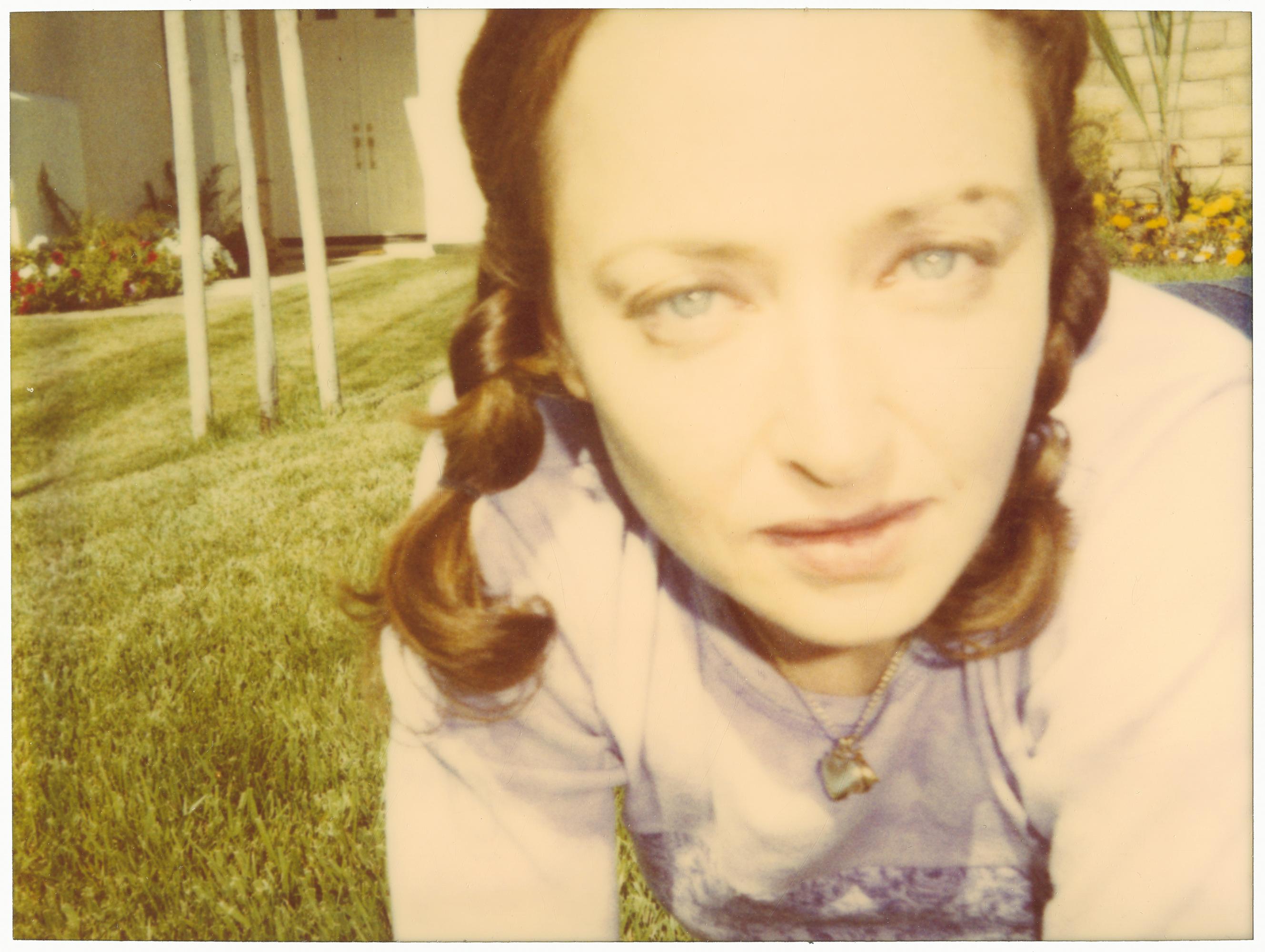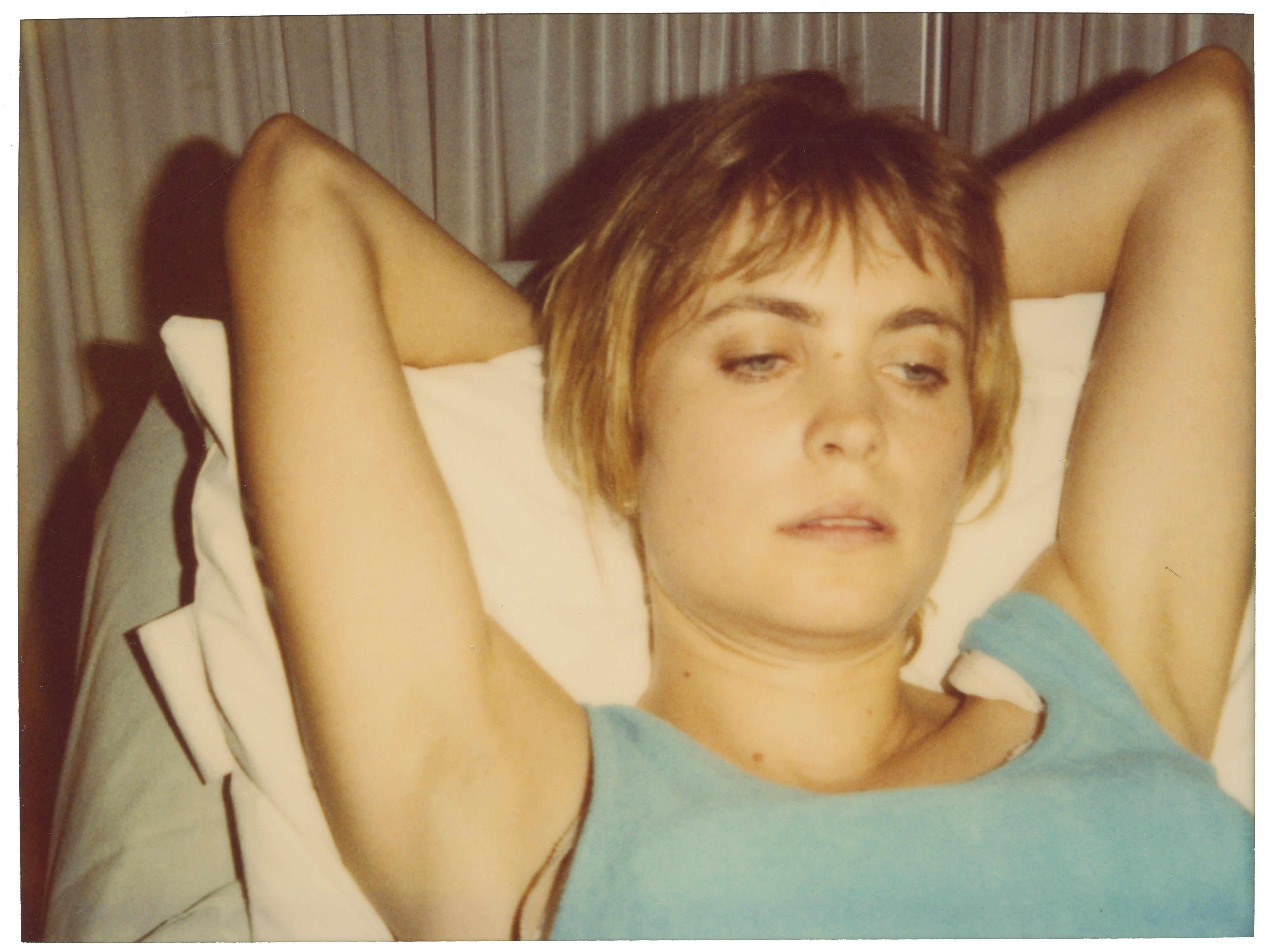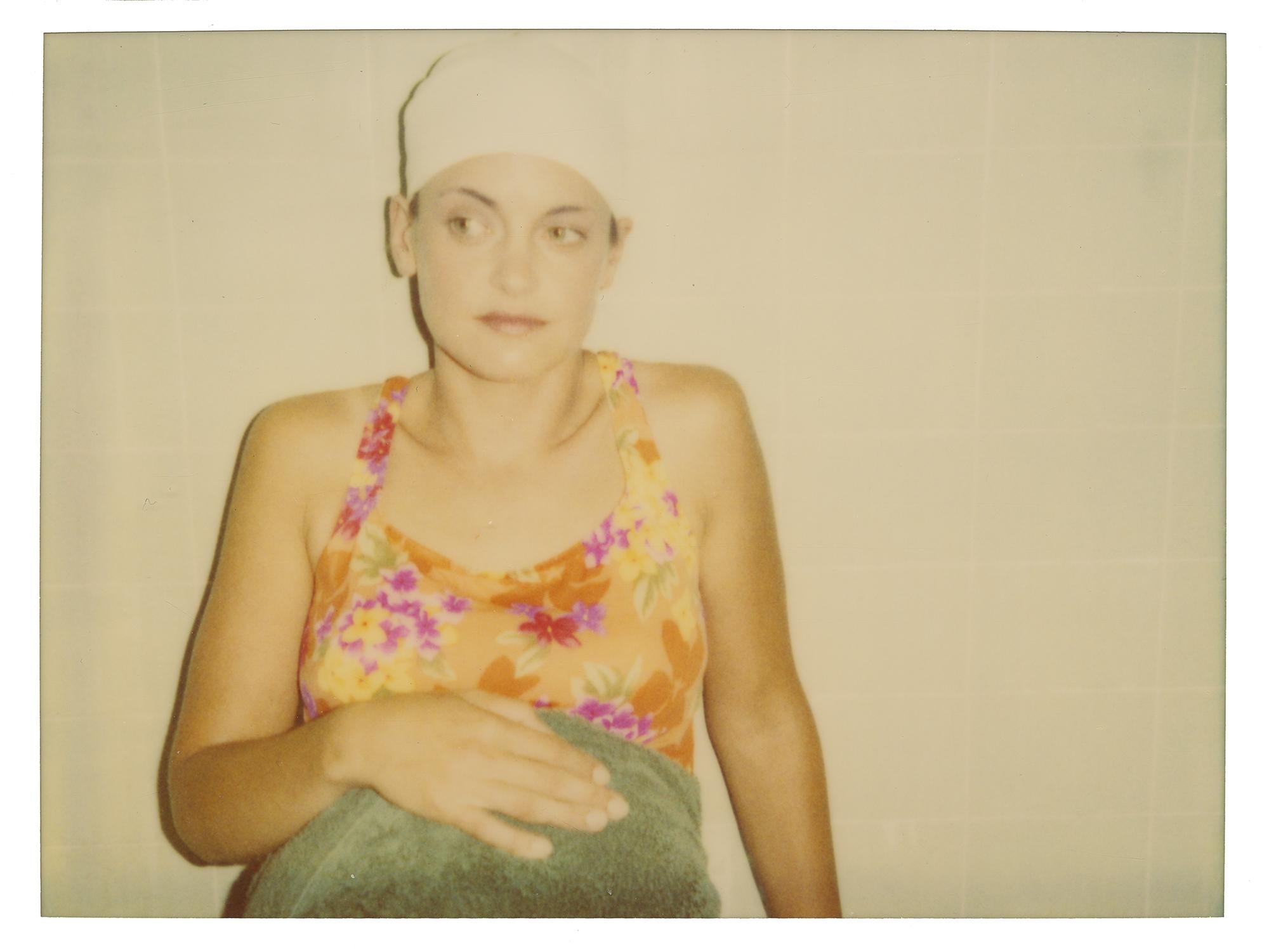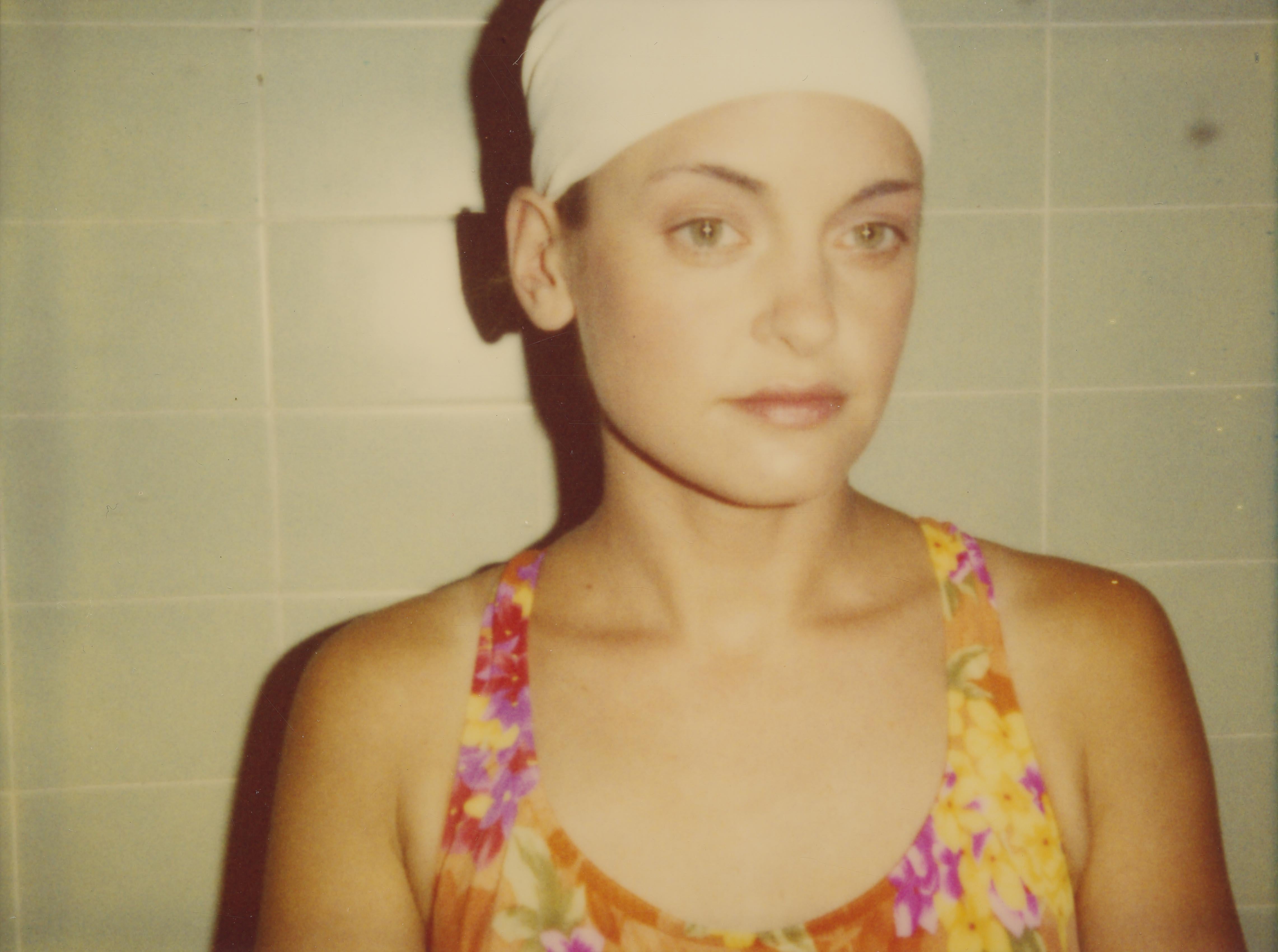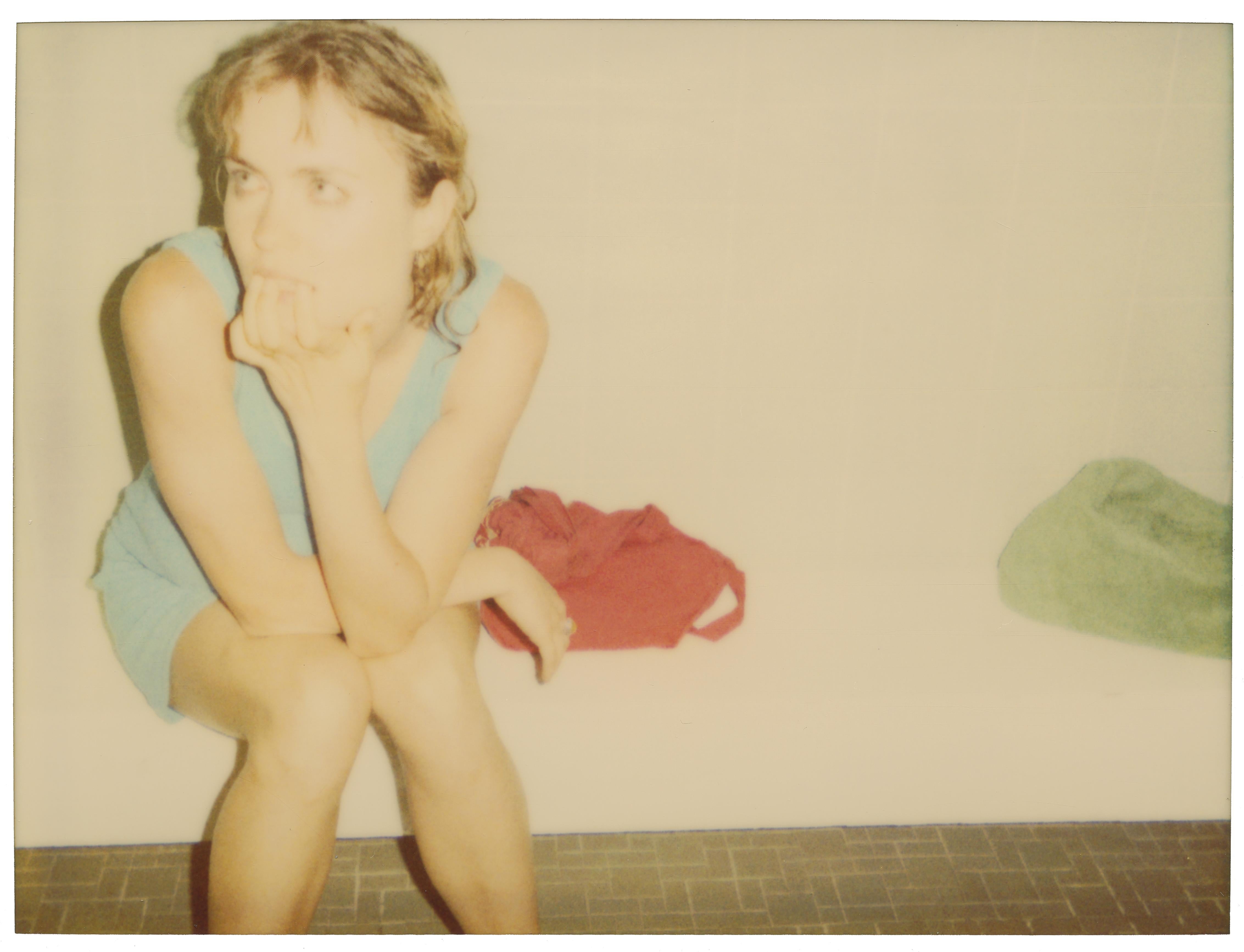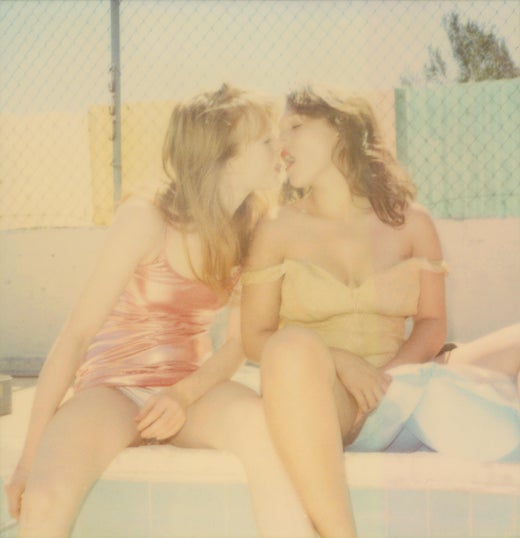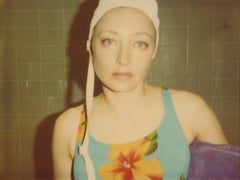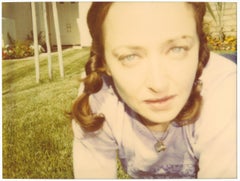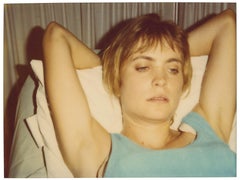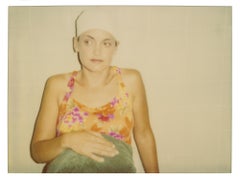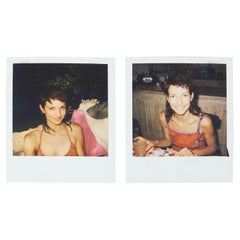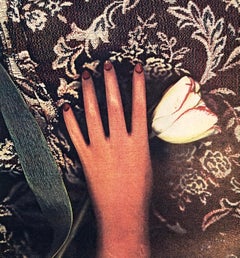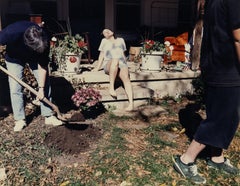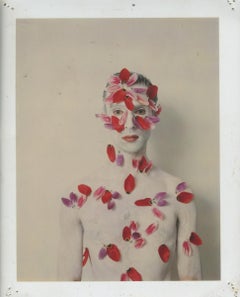Items Similar to Judith (Suburbia) Contemporary, Polaroid, Analog, Color, Photography
Want more images or videos?
Request additional images or videos from the seller
1 of 5
Stefanie SchneiderJudith (Suburbia) Contemporary, Polaroid, Analog, Color, Photography2004
2004
$980
£740.20
€855.46
CA$1,374.60
A$1,528.91
CHF 800.20
MX$18,647.64
NOK 10,054.78
SEK 9,457.82
DKK 6,385.14
About the Item
Judith (Suburbia) - 2004
50x60cm,
Edition of 10,
Archival C-Print based on a Polaroid,
Signed on verso with Certificate,
Artist inventory number: 1698.
Not mounted.
Stefanie Schneider’s work is a meditation on time—its erosion, its persistence, its ability to fracture and reassemble in the mind’s eye. Like faded dreams or half-remembered encounters, her Polaroid images exist in a liminal space where past and present bleed into one another, never quite whole, never truly lost.
Her process itself is an act of defying time. The expired Polaroid film she employs carries within it the chemical scars of its own history, yielding unpredictable mutations that transform each image into an artifact of imperfection. These distortions are not merely aesthetic choices but echoes of memory—relics of moments that refuse to remain static. In an era of hyper-clarity and digital perfection, Schneider’s art invites us to embrace the ephemeral, to find beauty in the decayed and the transient.
The American West, a landscape steeped in myth and reinvention, becomes the perfect backdrop for this exploration of time’s paradoxes. Her subjects—wandering figures in motels, trailer parks, and endless deserts—are suspended between nostalgia and an uncertain future, much like the film she captures them on. They exist in a cinematic loop, their stories unfolding and dissolving, caught in the glow of a setting sun that never fully disappears.
But there is a deeper shift at play, one that mirrors the changing nature of artistic life itself. Before 2020, artists thrived on movement, on exposure, on a constant dialogue between places and people. Travel was a necessity, a lifeline to new influences and inspirations. Yet, in the wake of global upheaval, a hyper-isolationist existence has taken hold, where the act of creation unfolds within a contained world. Schneider’s desert sanctuary reflects this new reality—an alternate universe born from necessity, a space where time stretches and bends inward, echoing the dreamlike qualities of her work. The outside world receded, but within this solitude, another form of freedom emerged: the ability to construct a world entirely of one’s own making.
Memory, like Schneider’s images, is imperfect. It shifts, it fades, it distorts. Yet, in these imperfections, new narratives emerge—ones that feel more real than reality itself. This is the power of Schneider’s work: to remind us that time is not linear but layered, that the past is never truly past, and that every moment carries the weight of all that came before.
Her work is not just a preservation of a vanishing medium—it is a meditation on the nature of remembrance itself. In every blurred silhouette and chemical wash of color, she captures what it means to hold onto time even as it slips through our fingers, to relive and reinterpret, over and over again, the memories we think define us. Schneider’s images are time capsules, not of fixed moments, but of the way moments feel—a testament to how time warps, erases, and ultimately reveals. They are not just photographs; they are fragments of time, unraveling like film caught in the projector’s glow, forever flickering between memory and dream.
Why do you think it is important to own art?
'We have art in order not to die of the truth'
Nietzsche
- Creator:Stefanie Schneider (1968, German)
- Creation Year:2004
- Dimensions:Height: 19.69 in (50 cm)Width: 23.63 in (60 cm)Depth: 0.04 in (1 mm)
- Medium:
- Movement & Style:
- Period:
- Condition:
- Gallery Location:Morongo Valley, CA
- Reference Number:1stDibs: LU652316205932
Stefanie Schneider
Stefanie Schneider received her MFA in Communication Design at the Folkwang Schule Essen, Germany. Her work has been shown at the Museum for Photography, Braunschweig, Museum für Kommunikation, Berlin, the Institut für Neue Medien, Frankfurt, the Nassauischer Kunstverein, Wiesbaden, Kunstverein Bielefeld, Museum für Moderne Kunst Passau, Les Rencontres d'Arles, Foto -Triennale Esslingen., Bombay Beach Biennale 2018, 2019.
About the Seller
4.9
Platinum Seller
Premium sellers with a 4.7+ rating and 24-hour response times
Established in 1996
1stDibs seller since 2017
1,036 sales on 1stDibs
Typical response time: 2 hours
- ShippingRetrieving quote...Shipping from: Morongo Valley, CA
- Return Policy
Authenticity Guarantee
In the unlikely event there’s an issue with an item’s authenticity, contact us within 1 year for a full refund. DetailsMoney-Back Guarantee
If your item is not as described, is damaged in transit, or does not arrive, contact us within 7 days for a full refund. Details24-Hour Cancellation
You have a 24-hour grace period in which to reconsider your purchase, with no questions asked.Vetted Professional Sellers
Our world-class sellers must adhere to strict standards for service and quality, maintaining the integrity of our listings.Price-Match Guarantee
If you find that a seller listed the same item for a lower price elsewhere, we’ll match it.Trusted Global Delivery
Our best-in-class carrier network provides specialized shipping options worldwide, including custom delivery.More From This Seller
View AllJudith (Suburbia) - Contemporary, Polaroid, Analog, Color, Photography, Portrait
By Stefanie Schneider
Located in Morongo Valley, CA
Judith (Suburbia) 2004
20x24cm,
Edition of 10,
Archival C-Print based on the Polaroid
not mounted,
Signed on verso with Certificate.
Artist Inventory No. 1673.01.
This project ...
Category
Early 2000s Contemporary Portrait Photography
Materials
Archival Paper, Photographic Paper, C Print, Color, Polaroid
Mrs. Jones (Suburbia) - analog - 21st Century, Contemporary, Polaroid, Portrait
By Stefanie Schneider
Located in Morongo Valley, CA
Mrs. Jones (Suburbia) 2004, 60x80cm,
Edition of 1/5, analog C-Print, hand-printed by the artist, based on a Polaroid,
not mounted, Signature label and Certificate, artist inventory...
Category
Early 2000s Contemporary Portrait Photography
Materials
Photographic Paper, C Print, Polaroid
$2,252 Sale Price
30% Off
Free Shipping
Angie (Suburbia) - Contemporary, Polaroid, Analog, Portrait
By Stefanie Schneider
Located in Morongo Valley, CA
Angie (Suburbia) featuring Aussie actress Radha Michell - 2004
38x50cm,
Edition of 10 plus 2 Artist Proofs.
Archival C-Print based on the Polaroid.
Signature label with Certifica...
Category
Early 2000s Contemporary Portrait Photography
Materials
Archival Paper, Photographic Paper, C Print, Color, Polaroid
Jean 3 (Suburbia) - Contemporary, Polaroid, Analog, Color, Photography, Portrait
By Stefanie Schneider
Located in Morongo Valley, CA
Jean III (Suburbia) 2004,
20x24cm, Edition of 1/10,
digital C-Print based on a Polaroid,
Signature label with Certificate.
Artist Inventory No. 1688.01.
Not mounted.
This project ...
Category
Early 2000s Contemporary Portrait Photography
Materials
Archival Paper, Photographic Paper, C Print, Color, Polaroid
Jean 2 (Suburbia) - Contemporary, Polaroid, Analog, Color, Photography, Portrait
By Stefanie Schneider
Located in Morongo Valley, CA
Jean II (Suburbia) - 2004
20x25cm,
Edition of 10 plus 2 Artist Proofs.
Archival C-Print, based on the Polaroid.
Certificate and Signature label.
Artist Inventory No. 1687.
Not mounted.
The project "Suburbia" was shot on the set of Marc Forster's first feature film 'Everything put Together' with Radha Mitchell, Michelle Hicks, Megan Mullally, Catherine Lloyd Burns, Matt Malloy and others.
Suburbs collectively, or the people who live in them
Suburb { a district, especially a residential one, on the edge of a city or large town }
synonyms [Outer edge , Fringes, Periphery, Limits, Outer reaches, Environs ]
Sunday in suburbia, a summer's day heavy with heat, hardly a soul to be seen. As a result, the motifs of Stefanie Schneider's “Suburbia” cycle – put together in California, in the very west of the USA – are virtually inconspicuous.Schneider's camera encircles an idyllic American setting, capturing a garden practically empty of people. Surrounded by a white picket fence, flowers and trees bloom profusely in the blazing sunlight. The day is empty and quiet like only a Sunday can be. The grass is perfectly cut, the garden well tended, the inhabitants oblivious to everything and lethargic. An instant is seized, revealing the tragedy of an average, unsuccessful, middle class life.
The scene is familiar from countless movies and American literature; the perfect façade of an American ideal, which seems to conceal the horror of daily life. In David Lynch's „Blue Velvet“ the film begins with the camera rolling over a similar setting: the view over the fence, the painstakingly neatly cut lawn, ending with a close-up: a cut-off ear covered with feasting ants.
Stefanie Schneider overdoes it, she exaggerates: this is confirmed by the irritating colourfulness as well as the vehemence of the motifs. Emptiness stands in stark contrast to the beauty of the blooming roses or the lush growth of the trees. The fenced, idyllic summer scene appears vacant; unused chairs surround a table, the grill untouched and clean, no object out of place. It is only the inhabitants who appear curiously lost. Schneider shows them in the middle of their saturated lives, in well-tended averageness, which can only be endured with a Martini on ice, on hand before lunch. In her opinion the scenes are banal, yet one becomes witness to great intimacy.
Schneider's „Suburbia“ cycle lives from the interplay of the motifs, and tells a story with the same flavour as American author Raymond Carver...
Category
Early 2000s Contemporary Portrait Photography
Materials
Archival Paper, Photographic Paper, C Print, Color, Polaroid
Lonesome (Suburbia) - Contemporary, Polaroid, Analog, Color, Photography
By Stefanie Schneider
Located in Morongo Valley, CA
Lonesome (Suburbia) - 2004
40x50cm,
Edition of 10,
Archival C-Print based on a Polaroid,
Signed on verso with Certificate,
Artist inventory number: 1742.
Not mounted.
In an ag...
Category
Early 2000s Contemporary Portrait Photography
Materials
Archival Paper, Photographic Paper, C Print, Color, Polaroid
You May Also Like
Miquel Arnal Set of Polaroid Photographs
By Miquel Arnal
Located in Barcelona, Barcelona
Set of polaroid photographs by Miquel Arnal.
In original condition, with minor wear consistent with age and use, preserving a beautiful patina.
Material:
Photographic paper
...
Category
1990s Spanish Post-Modern Photography
Materials
Paper
$600 Sale Price / set
35% Off
Seasons 1981 Photo Color Copier Print Photograph Museum Collected Art Xerography
By Leslie Schiff
Located in Surfside, FL
SEASONS (1981)
This is for the single print listed here. (not the outside folder or title sheet)
Title: Flowers in Hand. This one is hand signed and dated verso.
Seasons explores the seasons of Man, Woman, Child, Civilization, Nature and Technology. First digital artwork purchased by the Metropolitan Museum.
Date: 1980-1981
Medium: vintage color photocopy print.
“I worked at The Metropolitan Museum in 1981, when they acquired [Lesley’s] SEASONS portfolio.
We knew we wanted it, even though we didn’t have a category for it.” David Kiehl, Curator of Prints and Special Collections The Whitney Museum of American Art, New York City.
Lesley Schiff (born 1951) is an American fine artist. Schiff studied painting at the Art Institute Chicago before developing her signature practice using color laser printers to create images. Her work is included in the collections of the Whitney Museum of American Art, the Mead Art Museum and the Metropolitan Museum of Art and other major museums, corporate and private collections globally. Lesley Schiff revolutionized the photocopier from being an office tool to just another instrument in the artist's arsenal. Rather than addressing the tool in her work, Schiff instead uses the photocopier like a paintbrush to realize her vision. Once a painter, Schiff says: “I never intended to stop painting. I just decided to start painting with a modern tool. Working with the color laser printer keeps you in your culture. It's like America. Plugged in. Electronic. Direct." Painting with light, Schiff's body of work outlines a cycle of life: man, woman, child, civilization, nature, technology. More recent works challenge the viewer to understand the concept of eye-levels and perspectives, reinventing the way we see. Schiff's work was the Metropolitan Museum of Art's first digital acquisition, and most recently, was featured at the Whitney Museum of American Art in "Experiments in Electrostatics".
She uses a color laser printer “like a paintbrush” to create her art. She has said about her work and her tool: “I never intended to stop painting. I just decided to start painting with a modern tool. Working with the color laser printer keeps you in your culture. It's like America. Plugged in. Electronic. Direct—but no matter how hi-tech my tools become, I’m a painter, but instead of painting with oils, I paint with light.
The Whitney Museum will show Lesley Schiff's pioneering SEASONS portfolio in its entirety. Many prominent collections acquired SEASONS as their first digital artwork.
She participated in the Punk Art show in the 1970's. Her work kind of relates to Fluxus and Dada.
Leslie Schiff moved from Chicago to New York in the early 1970s. Much of her art involves collage and the Xerox photocopy machine. Her images are rooted in her personal psyche and have an intuitive meaning that is not always easily understood. In exhibitions, Xerox sheets are combined and displayed decoratively on the wall. Schiff has also created books; and made video and sound tapes. She was included in the seminal New York/New Wave 1981 exhibition show at MoMA PS1 along with Jean-Michel Basquiat, William S.Burroughs, David Byrne, Larry Clark, Crash (John Matos), Ronnie Cutrone, Brian Eno, Nan Goldin, Keith Haring, Ray Johnson, Joseph Kosuth, Robert Mapplethorpe, Kenny Scharf, Steven Sprouse, Andy Warhol and Lawrence Weiner.
She did a “visual biography,” comprised of portraits of Bob Dylan—depicted at different ages, from his 20s to his 60s—illustrations of his lyrics, and images of iconic objects like his sunglasses and harmonica. Schiff collaborated with Matthew Carter...
Category
1980s Contemporary Color Photography
Materials
Color
Tracey Baran, Vintage 90s Photography, Casual Backyard Scene, Relaxing
Located in New York, NY
Tracey Baran, Vintage 90s Photography, Casual Backyard Scene, Relaxing
Untitled, 1998
Signed, dated, and numbered in ink, verso
Chromogenic ...
Category
1990s Contemporary Photography
Materials
C Print
Untitled Polaroid 23, Unique Self Portrait Photograph by Dietmar Busse
By Dietmar Busse
Located in New York, NY
Untitled Polaroid 23, Unique Self Portrait Photograph by Dietmar Busse.
2001
Signed and dated in black ink, verso
Polaroid (Unique)
5 x 4 inches, image
Contact gallery for price.
Category
Early 2000s Contemporary Photography
Materials
Polaroid
Chelsea Hotel #3 – Emma Summerton, Polaroid, Interior, Woman, Nude, Polaroid
By Emma Summerton
Located in Zurich, CH
Emma SUMMERTON (*1970, Australia)
Chelsea Hotel #3, 2003
Archival pigment print on Hahnemühle Paper
100 x 120 cm (39 3/8 x 47 1/4 in.)
Edition of 5, plus 2 AP; Ed. no. 1/5
Print only...
Category
Early 2000s Contemporary Color Photography
Materials
Archival Pigment
Price Upon Request
Free Shipping
Portrait of Mechthild Grossmann - Vintage Photo - 1970s
Located in Roma, IT
Vintage photograph realized in 1970s.
Excellent condition.
Category
1970s Contemporary Figurative Photography
Materials
Photographic Paper
